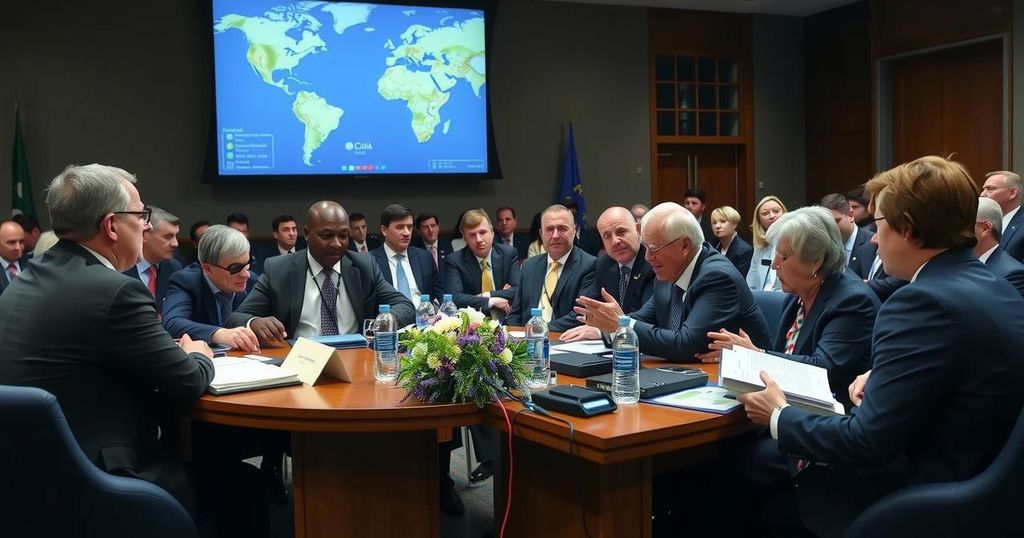World news
ALEX BRANDON, ASIA, ASSOCIATED PRESS, AT, ATTILA STEINER, AZERBAIJAN, BAKU, COUNCIL OF, COUNCIL OF THE EU, DONALD TRUMP, EU, EUROPE, EUROPEAN UNION, FRANCESCO CORVARO, GI, GIORGIA MELONI, INTERNATIONAL RELATIONS, ITALY, KRIS, KRISTI NOEM, OAKS, PA, ORBAN, ORBÁN, PETER DEJONG, PHILIPPINES, POLITICS, PRESIDENTIAL ELECTIONS, RAF, RAFIQ MAQBOOL, SERGEI GRITS, TRUMP, TRUMP ADMINISTRATION, VIKTOR ORBAN, VIKTOR ORBÁN
Maya Ramirez
0 Comments
Contrasting Climate Approaches: Trump’s Rejection vs. European Right-Wing Advocacy
This article examines the contrasting approaches to climate action between Donald Trump’s anti-climate stance and the proactive measures taken by right-wing governments in Europe, such as Hungary and Italy. While Trump seeks to expand fossil fuel production, European leaders advocate for strong climate policies, recognizing them as essential for national interest and economic growth. The differing contexts underscore a significant political shift in the landscape of climate governance.
In stark contrast to President Donald Trump’s opposition to climate action, several right-wing governments, including those in Hungary and Italy, are advocating for robust climate policies. During the COP29 U.N. Climate Summit in Baku, Hungary’s Prime Minister Viktor Orbán and Italy’s Prime Minister Giorgia Meloni highlighted the necessity of addressing climate change, framing it as a priority for their nations and an opportunity for economic resilience. While Trump has championed increasing fossil fuel production, claiming climate initiatives hinder U.S. interests, European leaders are integrating climate action into their governance strategies, recognizing public awareness and the growing urgency for environmental stewardship.
Trump, who previously withdrew the United States from the Paris Agreement and proposed scaling back international environmental commitments, is diverging from the climate-focused rhetoric of leaders in Hungary and Italy, who support ambitious targets for reducing emissions. Experts point out that the economic contexts of these countries significantly influence their climate stances, as nations with fewer fossil fuel resources prioritize energy security through renewable energy.
In Hungary, officials express that climate action is essential for national progress, with Veronika Bagi from Hungary’s EU council presidency stating, “You see from people, it’s their priority. They are becoming more and more aware.” In the U.S., however, climate action is often perceived through a lens of political identity, with fossil fuel interests exerting considerable influence over policy decisions. The disparities between American and European right-wing parties reveal a fundamental philosophical divergence regarding the role of government in addressing climate challenges.
Furthermore, while there exists a republican faction in Europe resistant to climate initiatives, the overall approach emphasizes collaboration with the European Union to transition towards greener energy sources, aided by substantial EU funding. This collaborative climate policy extends beyond Europe, exemplified by President Ferdinand Marcos Jr. of the Philippines, who has initiated measures to bolster climate resilience in a country highly vulnerable to climate impacts. Thus, a notable shift towards climate action among right-wing governments challenges the conventional narrative surrounding climate responsibility, indicating an evolving landscape in global environmental governance.
This article discusses the contrasting perspectives on climate action among right-wing governments, particularly contrasting the United States under Donald Trump with European nations such as Hungary and Italy. Scholars and policymakers suggest that while Trump has consistently downplayed climate change and advocated for fossil fuel expansion, leaders from these European nations position climate action as integral to national interests and economic strategies. The growing acknowledgment of climate priorities in European politics reflects a shift driven by public demand and a recognition of energy security through sustainable practices.
In summary, while Donald Trump and similar right-wing factions in the U.S. resist climate action, several right-wing governments in Europe, particularly Hungary and Italy, actively advocate for strong climate policies. Their stance emphasizes the necessity of addressing climate change as a national priority that intertwines with economic opportunities. The divergent approaches to climate action highlight a crucial shift in political ideologies, demonstrating that right-wing politics can align with climate responsibility when framed alongside issues of economic stability and national security.
Original Source: apnews.com




Post Comment